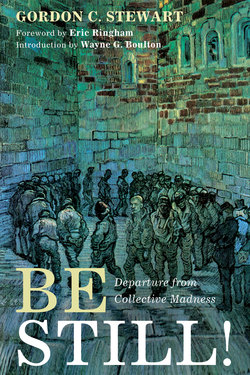Читать книгу Be Still! - Gordon C. Stewart - Страница 15
Mysterium Tremendum
ОглавлениеLittle Boys with Toys
Man is unwilling to accept the limits of his thinking.It is this nonacceptance which lies at the root both of “needs” and “self-deceit.” It is the unwillingness to accept the fact that our understanding cannot transcend the limits of experience which leads not only to self-deceit but also to presumption.
—Willem Zuurdeeg10
It’s one thing to play with toys. It’s something else when the toys are nuclear bombs and missiles.
Watching North Korea’s young leader Kim Jong-un play with the possibility of nuclear holocaust, Rudolf Otto’s idea of the mysterium tremendum et fascinans, the source of holy dread and attraction that sends shudders down the human spine, comes clearly into view.
In The Idea of the Holy: An Inquiry into the Non-Rational Factor in the Idea of the Divine and its Relation to the Rational11, Otto examines the dimension of human life that is non-rational—neither rational nor irrational. Otto calls it the “numinous”—the “non-rational, non-sensory experience or feeling whose primary and immediate object is outside the self”—the source of both holy dread and majesty and the foundation of all religion.
The experience of the mysterium tremendum et fascinans—a Latin phrase defying precise definition, roughly translated as “the fearful and fascinating mystery,” is sui generis—a category all its own. This mysterium invokes the senses of vulnerability and wonder, death and awe, the tremor and fascination of the finite before the infinite, the shiver of what is mortal standing before the abyss of nothingness and the glory of the eternal. It is the reality at once terrifying and sublime behind, below, above, and beyond the human condition.
We are shaped by “the age of reason” and the deeply held belief in historical progress. Those who lived before the idea of progress became the dominant Western conviction and preoccupation were more directly in touch with the numinous—more present, less distracted, and perhaps, in that sense, saner. But there are times that call the belief in progress into question. Times when we stand as directly before the mysterium tremendum et fascinans as those who lived under the stars and slept in caves.
North Korea’s young leader Kim Jong-un threatening the world with nuclear holocaust abruptly challenges the optimistic view that history is an upward course of inevitable progress. We tremble once again at the fearfulness of mortality, but this time it is the tremble at what our own hands have made in the name of progress—the power of extinction.
The power of death is enticing, a sin to which Robert Oppenheimer, the father of the atomic bomb, later confessed. The human will to power becomes evil when real soldiers, real nuclear bombs, real missiles, and real threats of destruction are mistaken for childhood toys and computer games where human folly can be erased by hitting a reset button.
Looking at the young North Korean leader, psychiatrists might see an Oedipal complex, the son outdoing the father at the game of nuclear threat, the boy who played with matches, determined that if his father was afraid to light the fuse, he would step out from his father’s shadow onto the stage of world power in a way the world would never forget. We are all children inside, for both good (remaining childlike) and ill (remaining childish).
But deeper and more encompassing than any Freudian analysis is Otto’s mysterium tremendum et fascinans.
The philosophical-theological debates about modernism and postmodernism are interesting. They deserve attention. But neither modernism’s rationalism nor postmodernism’s deconstructionism is equipped to address the most basic reality underlying the human condition: the mysterium tremendum et fascinans and the horror of its demonic distortion in the shrinking of it by the madness of the human will to power.
Whenever we take the ultimate trembling and fascination of the self into our own hands, the world is put at risk. In the prehistoric world of our evolutionary ancestors, the consequences were limited to a neighbor’s skull broken with a club. In the advanced species that has progressed from those primitive origins, we have fallen in love with our own toys of destruction. The technical achievements and manufactured mysteries have become deadly surrogates for the mysterium tremendum et fascinans, sending shudders down the spine in terror and in joy before what is Real.
Our time is perilously close to mass suicide. Unless and until we get it straight that I and we are not the center of the universe, the likes of Kim Jong-un—and his mirror opposites but like-minded opponents on this side of the Pacific—will hold us hostage to the madness that lurks in human goodness.
Progress isn’t all it’s cracked up to be. The ancient shudder of the creature—the human cry for help in the face of chaos and the heart’s leap toward what is greater than the self or our social constructs—unmasks every illusion of grandeur in a world increasingly put at risk by little boys with toys.
10. Zuurdeeg, Man Before Chaos, 140.
11. Rudolf Otto’s seminal work was first published in 1917 under the title Das Heilige—Über das Irrationale in der Idee des Göttlichen und sein Verhältnis zum Rationalen (English: The Holy—On the Irrational in the Idea of the Divine and Its Relation to the Rational).
